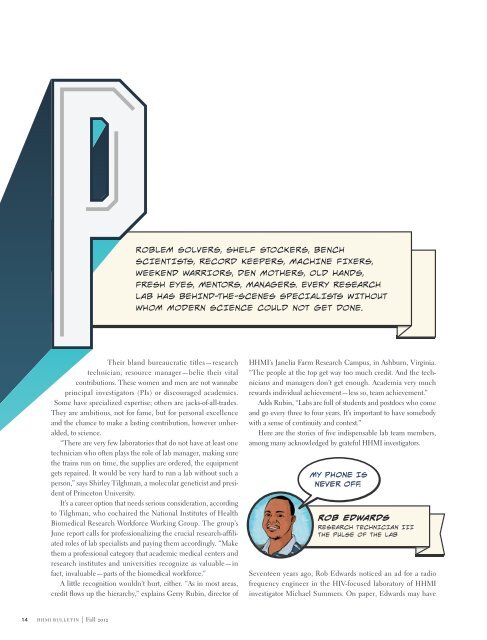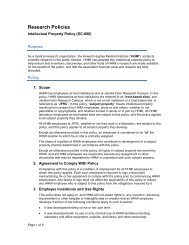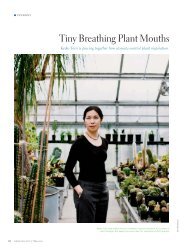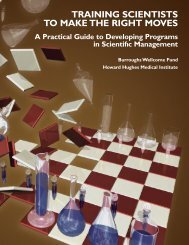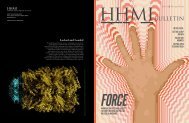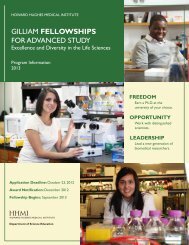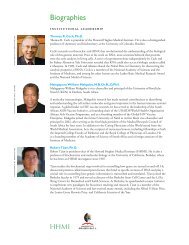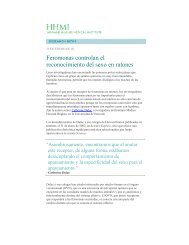Download PDF - Howard Hughes Medical Institute
Download PDF - Howard Hughes Medical Institute
Download PDF - Howard Hughes Medical Institute
Create successful ePaper yourself
Turn your PDF publications into a flip-book with our unique Google optimized e-Paper software.
oblem solvers, shelf stockers, bench<br />
scientists, record keepers, machine fixers,<br />
weekend warriors, den mothers, old hands,<br />
fresh eyes, mentors, managers. Every research<br />
lab has behind-the-scenes specialists without<br />
whom modern science could not get done.<br />
Their bland bureaucratic titles—research<br />
technician, resource manager—belie their vital<br />
contributions. These women and men are not wannabe<br />
principal investigators (PIs) or discouraged academics.<br />
Some have specialized expertise; others are jacks-of-all-trades.<br />
They are ambitious, not for fame, but for personal excellence<br />
and the chance to make a lasting contribution, however unheralded,<br />
to science.<br />
“There are very few laboratories that do not have at least one<br />
technician who often plays the role of lab manager, making sure<br />
the trains run on time, the supplies are ordered, the equipment<br />
gets repaired. It would be very hard to run a lab without such a<br />
person,” says Shirley Tilghman, a molecular geneticist and president<br />
of Princeton University.<br />
It’s a career option that needs serious consideration, according<br />
to Tilghman, who cochaired the National <strong>Institute</strong>s of Health<br />
Biomedical Research Workforce Working Group. The group’s<br />
June report calls for professionalizing the crucial research-affiliated<br />
roles of lab specialists and paying them accordingly. “Make<br />
them a professional category that academic medical centers and<br />
research institutes and universities recognize as valuable—in<br />
fact, invaluable—parts of the biomedical workforce.”<br />
A little recognition wouldn’t hurt, either. “As in most areas,<br />
credit flows up the hierarchy,” explains Gerry Rubin, director of<br />
HHMI’s Janelia Farm Research Campus, in Ashburn, Virginia.<br />
“The people at the top get way too much credit. And the technicians<br />
and managers don’t get enough. Academia very much<br />
rewards individual achievement—less so, team achievement.”<br />
Adds Rubin, “Labs are full of students and postdocs who come<br />
and go every three to four years. It’s important to have somebody<br />
with a sense of continuity and context.”<br />
Here are the stories of five indispensable lab team members,<br />
among many acknowledged by grateful HHMI investigators.<br />
my phone is<br />
never off.<br />
ROB edwards<br />
Research Technician III<br />
The Pulse of the Lab<br />
Seventeen years ago, Rob Edwards noticed an ad for a radio<br />
frequency engineer in the HIV-focused laboratory of HHMI<br />
investigator Michael Summers. On paper, Edwards may have<br />
14 h h m i b u l l e t i n | Fall 2o12


